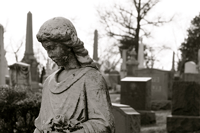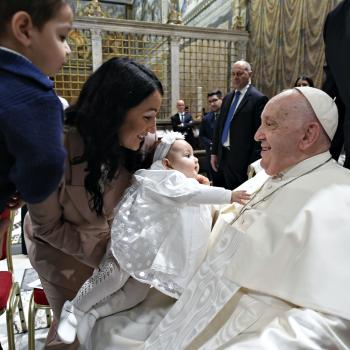 ByBriane K. Turley
ByBriane K. Turley
Several years ago, a parishioner dropped by my office to dispute a pro-life sermon I had delivered to our congregation a few days earlier. "You are dragging your politics into the church," he insisted. "I think it is wrong for you to preach on politics. We come to church to hear about faith, not politics."
In response, I explained to my Christian brother that our Church's pro-life commitment is theological in its origins and has never been politically inspired. Therefore, I suggested that it was my faith which had come into conflict with his politics.
Yet the fact is that the boundaries between faith and politics among Christians are not as easily demarcated as some may wish to suggest. The Greek words polis and polītikós that provide roots for our term "political" indicate one who attempts to serve honorably as a citizen within a city or nation. With the exception of a few communitarian groups like the Amish, most committed Christians feel duty bound to reflect on their faith before entering a voting booth or expressing their political views to others.
Good citizenship and faith have gone hand in hand since the days of the early church. A citizen of the Roman Empire, from time to time St. Paul publicly addressed moral issues that ran counter to Christ's teachings -- the Athenian Areopagus in Acts 17 provided just such a forum. While his opposition to Greco-Roman morality would, at that time, have been deemed "political," the Apostle embraced his role as a fellow citizen in this world guiding his neighbors toward life in the Kingdom of God.
Moreover, from the first century until the early 1960s, all of Christendom spoke with a unified voice to its surrounding cultures on the sanctity of human life, and especially the value God places on our most vulnerable. St Paul set the character of the Church's theology of life when, to the Church in Corinth, he articulated God's passion for the defenseless:
"[T]he members of the body that seem to be weaker are indispensable, and those members of the body that we think less honorable we clothe with greater honor, and our less respectable members are treated with greater respect; whereas our more respectable members do not need this. But God has so arranged the body, giving the greater honor to the inferior member, that there may be no dissension within the body, but the members may have the same care for one another. If one member suffers, all suffer together with it; if one member is honored, all rejoice together with it." (I Corinthians 12:22-26)
Millennia before life issues like abortion and euthanasia were usurped as the exclusive fare of death-culture political pundits, virtually all Christians consistently underscored the importance of honoring the lives of our most vulnerable: our preborn children, those with moderate and profound disabilities, and our elderly.
Depending on the time and place, Catholic leaders recommended different means for men and women to repent of their involvement in abortion and gain restoration to the faith, but Catholicism remained unswerving in its teachings that abortion and euthanasia are unacceptable acts.
Many things changed during the sixteenth-century Protestant Reformation, but the Reformers' commitment to life was not among them. Early Protestant leaders including Martin Luther, John Calvin, and Menno Simons maintained invariable pro-life stands.
Luther, for example, declared, "How great, therefore, the wickedness of human nature is! How many girls there are who prevent conception and kill and expel tender fetuses, although procreation is the work of God."
Reformed Church leader John Calvin argued that "it is almost a monstrous crime to rob [the preborn child] of the life which it has not yet begun to enjoy. If it seems more horrible to kill a man in his own house than in a field, because a man's house is his place of most secure refuge, it ought surely to be deemed more atrocious to destroy a fetus in the womb before it has come to light."
It was not until the late 1960s and early '70s that many poorly catechized Christians gradually capitulated to the dominant culture's siren song, which lulled them into believing that many core theological and moral issues (including family matters, human sexuality, and our consistent honoring of human life) subsist in the political rather than the broader ecclesial sphere.
Once Protestant and Anglican citizens in many Western countries succumbed to the pressures of secularized authority, a growing number circumvented open discourse on life issues ranging from euthanasia and physician-assisted suicide to abortion and infanticide (late-term and partial-birth abortion) on the grounds that they were deemed too "political.




